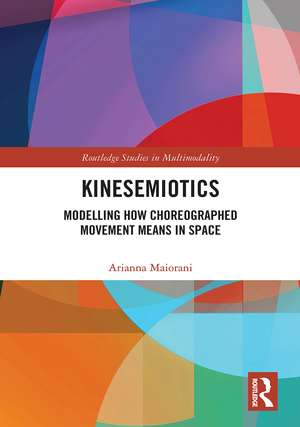Kinesemiotics: Modelling How Choreographed Movement Means in Space: Routledge Studies in Multimodality
Autor Arianna Maioranien Limba Engleză Hardback – 30 noi 2020
It begins with a theoretical overview and review of existing literature on the main approaches to movement-based communication, specifically dance, which underpin kinesemiotics as an area of study. It reaffirms previous work which established dance as a form of embodied communication in that it encompasses a wide range of semiotic styles and forms shared by communities of "speakers." In collaboration with the English National Ballet, Maiorani employs the genre of ballet as a means through which to understand and analyse some of the key concepts of kinesemiotics, mainly that of space as a semiotic dimension and "motivated movement," or movement with meaning. Supported by automated movement recognition tools from the fields of bio-robotics engineering and computer science, Maiorani argues for ballet’s capacity, when movements are projected into meaningful space, to extend beyond sequences of physical movements to become a meaning making practice.
Kinesemiotics advances interdisciplinary research in the fields of social semiotics, media and communication, multimodality, linguistics, and performance studies and will be of particular interest to students and scholars in these areas.
| Toate formatele și edițiile | Preț | Express |
|---|---|---|
| Paperback (1) | 377.14 lei 6-8 săpt. | |
| Taylor & Francis – 30 mai 2022 | 377.14 lei 6-8 săpt. | |
| Hardback (1) | 1000.27 lei 6-8 săpt. | |
| Taylor & Francis – 30 noi 2020 | 1000.27 lei 6-8 săpt. |
Din seria Routledge Studies in Multimodality
-
 Preț: 312.54 lei
Preț: 312.54 lei -
 Preț: 153.48 lei
Preț: 153.48 lei -
 Preț: 309.90 lei
Preț: 309.90 lei -
 Preț: 640.52 lei
Preț: 640.52 lei -
 Preț: 311.41 lei
Preț: 311.41 lei -
 Preț: 311.41 lei
Preț: 311.41 lei -
 Preț: 279.17 lei
Preț: 279.17 lei - 26%
 Preț: 764.22 lei
Preț: 764.22 lei - 26%
 Preț: 845.69 lei
Preț: 845.69 lei - 18%
 Preț: 1000.27 lei
Preț: 1000.27 lei -
 Preț: 389.66 lei
Preț: 389.66 lei -
 Preț: 432.29 lei
Preț: 432.29 lei - 18%
 Preț: 1000.27 lei
Preț: 1000.27 lei -
 Preț: 389.66 lei
Preț: 389.66 lei -
 Preț: 413.33 lei
Preț: 413.33 lei - 16%
 Preț: 264.38 lei
Preț: 264.38 lei - 16%
 Preț: 260.63 lei
Preț: 260.63 lei -
 Preț: 489.14 lei
Preț: 489.14 lei -
 Preț: 389.66 lei
Preț: 389.66 lei - 26%
 Preț: 821.53 lei
Preț: 821.53 lei -
 Preț: 389.66 lei
Preț: 389.66 lei - 26%
 Preț: 764.20 lei
Preț: 764.20 lei -
 Preț: 388.26 lei
Preț: 388.26 lei - 18%
 Preț: 1108.37 lei
Preț: 1108.37 lei -
 Preț: 441.22 lei
Preț: 441.22 lei - 26%
 Preț: 764.62 lei
Preț: 764.62 lei - 18%
 Preț: 1000.27 lei
Preț: 1000.27 lei -
 Preț: 414.32 lei
Preț: 414.32 lei - 18%
 Preț: 997.11 lei
Preț: 997.11 lei - 25%
 Preț: 881.61 lei
Preț: 881.61 lei -
 Preț: 486.38 lei
Preț: 486.38 lei -
 Preț: 389.66 lei
Preț: 389.66 lei - 25%
 Preț: 879.65 lei
Preț: 879.65 lei -
 Preț: 389.66 lei
Preț: 389.66 lei - 18%
 Preț: 1053.92 lei
Preț: 1053.92 lei - 18%
 Preț: 1056.28 lei
Preț: 1056.28 lei - 12%
 Preț: 325.34 lei
Preț: 325.34 lei
Preț: 1000.27 lei
Preț vechi: 1219.84 lei
-18% Nou
Puncte Express: 1500
Preț estimativ în valută:
191.43€ • 197.49$ • 162.01£
191.43€ • 197.49$ • 162.01£
Carte tipărită la comandă
Livrare economică 05-19 martie
Preluare comenzi: 021 569.72.76
Specificații
ISBN-13: 9780367272470
ISBN-10: 0367272474
Pagini: 102
Ilustrații: 14 Line drawings, black and white; 12 Halftones, color; 26 Illustrations, black and white
Dimensiuni: 152 x 229 x 13 mm
Greutate: 0.45 kg
Ediția:1
Editura: Taylor & Francis
Colecția Routledge
Seria Routledge Studies in Multimodality
Locul publicării:Oxford, United Kingdom
ISBN-10: 0367272474
Pagini: 102
Ilustrații: 14 Line drawings, black and white; 12 Halftones, color; 26 Illustrations, black and white
Dimensiuni: 152 x 229 x 13 mm
Greutate: 0.45 kg
Ediția:1
Editura: Taylor & Francis
Colecția Routledge
Seria Routledge Studies in Multimodality
Locul publicării:Oxford, United Kingdom
Public țintă
PostgraduateCuprins
Preface and Acknowledgements
Introduction
What is Kinesemiotics?
Chapter I – How to capture dance discourse?
Open-ended conclusions
Bibliography
Index
Introduction
What is Kinesemiotics?
Chapter I – How to capture dance discourse?
- Dance notation systems: what they do and do not do.
- Dance as a language: the approach of dance studies, kinesthetics and cognitive sciences to movement-based communication.
- A socio-semiotic approach to dance: the theoretical background of Kinesemiotics.
- Kinesemiotics and the human body in space.
- Space as a Semiotic Dimension
- Motivated Movement as Projection and the Idea of Dance Discourse
- The Functional Grammar of Dance model
- Dance as a Mode
- Dance language: system, instantiation and realization
- Dance Discourse and Music
- Introduction to the analysis
- Body parts movement possibilities in the FGD system
- Comparative examples of manual analysis of moves and sequences.
- Dance discourse and the music score.
- Why automated analysis? Reasons and prospects for developing digital recognition of dance discourse.
- The experiment protocol
Open-ended conclusions
Bibliography
Index
Notă biografică
Arianna Maiorani is Senior Lecturer in Linguistics at the School of Arts, English and Drama at Loughborough University, UK.
Descriere
This innovative work introduces the interdisciplinary field of research of kinesemiotics, offering a new adaptable model and means of analysis for understanding forms of movement-based communication, such as dance, that use a codified language shared by a community of users.
